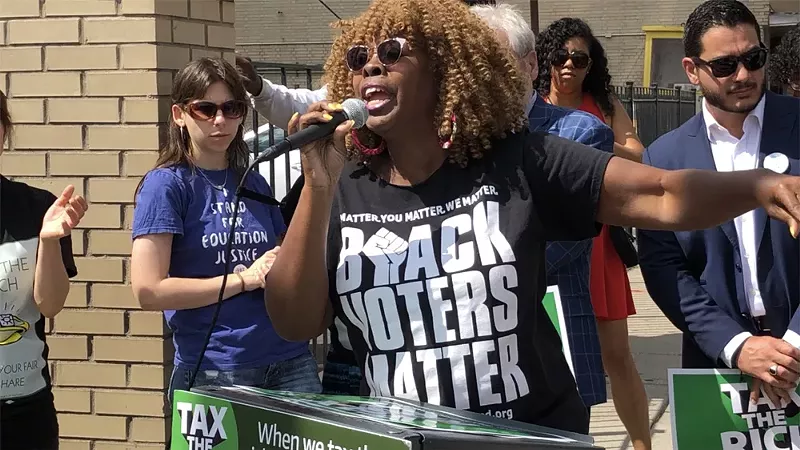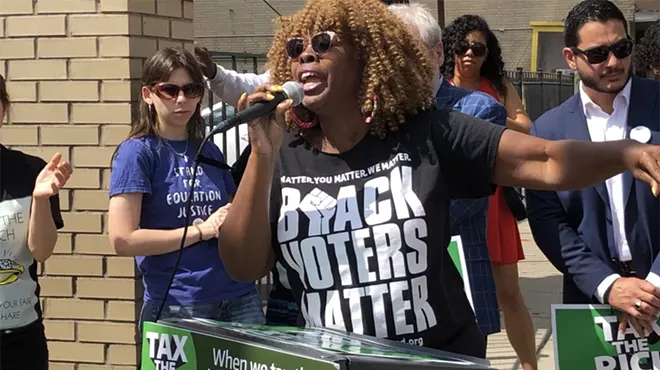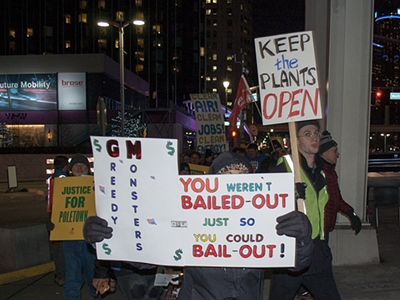
Audio By Carbonatix
[
{
"name": "GPT - Leaderboard - Inline - Content",
"component": "35519556",
"insertPoint": "5th",
"startingPoint": "3",
"requiredCountToDisplay": "3",
"maxInsertions": 100,
"adList": [
{
"adPreset": "LeaderboardInline"
}
]
}
]

Steve Neavling
LaTosha Brown, co-founder of Black Voters Matter.
Disgust of President Donald Trump alone will not get Black voters from Michigan out to the polls, a new Los Angeles Times report details.
The piece profiles several Black voters in Michigan who chose not to vote in 2016, as well as their mindsets going into the upcoming 2020 presidential election.
In 2016, many Black voters felt like the Democratic party let them down, and voter turnout fell when they were asked to support Hillary Clinton in the presidential election — a candidate who didn't campaign in Michigan until a mere few days before the election.
As Metro Times previously reported, the Democratic party's presidential candidates usually receive more than 95% of Detroit's vote, but that doesn't mean that those votes are guaranteed. The number of residents in Detroit — a city that is about 80 percent African-American — who cast a ballot during presidential elections dropped from 335,000 to 247,000 in 2016. PEW Research also found that year that the Black voter turnout rate across the country declined for the first time in two decades for a presidential election.
Now, it seems there's more excitement about voting from this core segment of Michigan’s Democratic base after several years of living in Trump’s America.
Oriana Powell, a 30-year-old working mother, Democrat, and Detroit native, says she regrets her decision not to vote in 2016 after seeing how Trump has exacerbated racial tensions.
“I didn’t really contemplate what that would mean — giving it to the other side,” she told the LA Times.
The regret she feels over that lost vote — as Trump won Michigan by fewer than 12,000 votes — has caused Powell to rally and become a grassroots political organizer in order to help another candidate to beat Trump in 2020. The issues that most concern her are family medical leave, affordable child care, and mass incarceration. Powell’s father was incarcerated after President Bill Clinton signed a crime bill in 1994 that resulted in a disproportionate increase in incarcerated men of color.
“I was 15 years old when my dad got out of prison,” Powell said. “My family was broken because of that.”
Others might be more difficult for the Democrats to win over in 2020. This time, the voter segment wants to know that the candidates it tries to help elect now will later keep in mind the vows they make to the Black community even after getting elected. Black voters want to know that Democrats will be able to solve issues the Black community faces, including home foreclosures, school quality, and high rates of joblessness.
“They’re fixing up downtown, but for who?” John Ware, an African-American from southwest Detroit, told the Times. “Not for me or my people.”
Ware “doesn’t know what they could say to get him to vote next year,” according to the Times. LaTarro Traylor, 36, a small-business attorney in Grand Rapids, expressed similar exasperation.
“It’s like, I’ve got all of this love to give and I’m just waiting for my suitor to come and let me love on ‘em — but I know my worth,” Traylor told the Times, referring to the candidates.
Traylor didn’t vote in 2016 and said she doesn’t regret that decision. In reference to how Black voters are regarded, she said: “It’s always our job to save the world. … But it’s like we don’t matter policywise.”
Black voters often feel that the party panders to them during election season, only to cast their needs and concerns to the side later on — so it would be unwise for Democrats to take them for granted and assume the party has their vote. If Dems want to inspire Black voters to make it to the polls on election day, they're going to have to make a sincere effort this time around.
Stay on top of Detroit news and views. Sign up for our weekly issue newsletter delivered each Wednesday.






